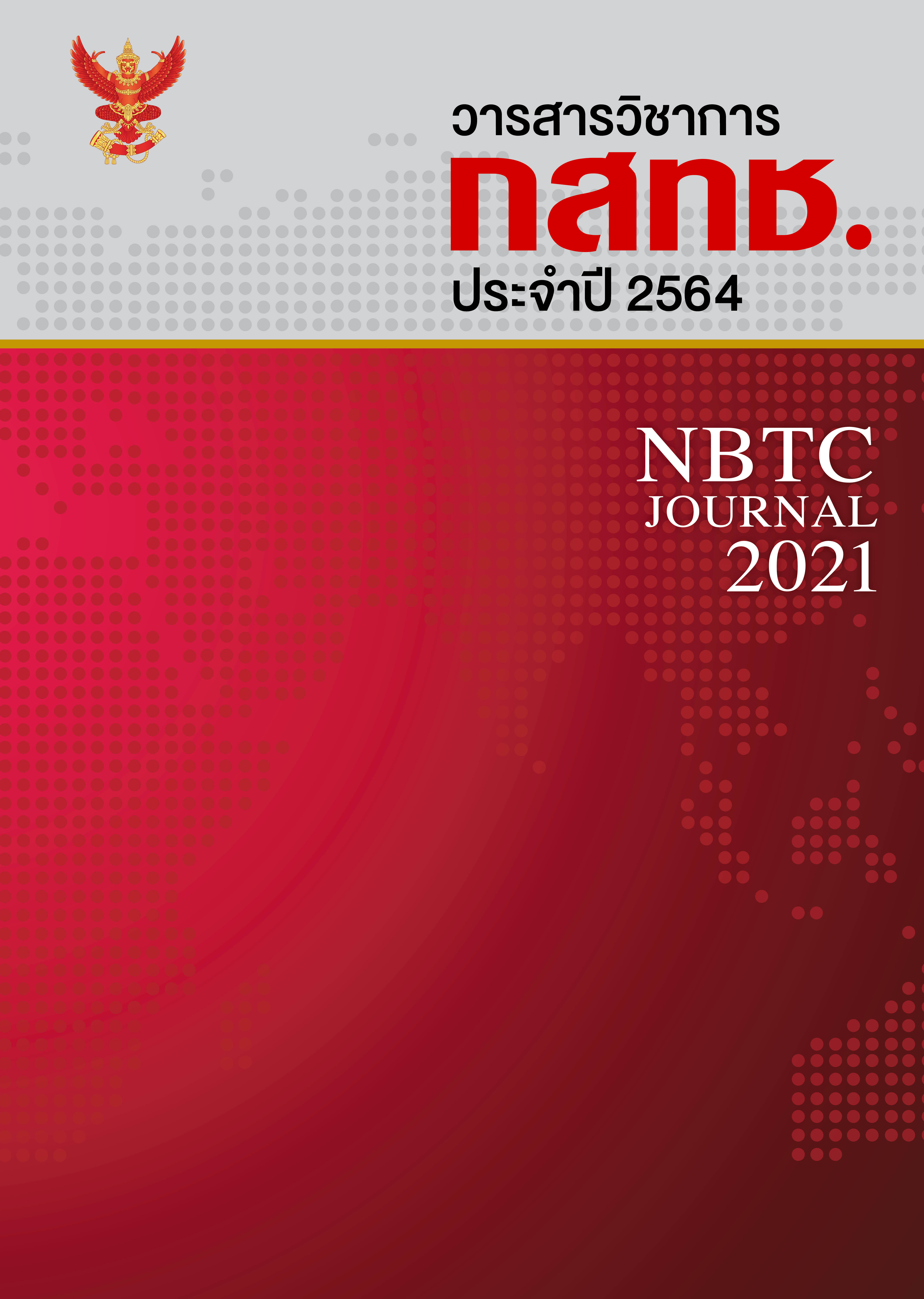การกำหนดมาตรการหลักความเป็นกลางทางเน็ตของประเทศไทย บนหลักการเพื่อการแข่งขันแบบอิสระและเป็นธรรม ควบคุมหรือผ่อนปรน
คำสำคัญ:
หลักความเป็นกลางทางเน็ต, การกำกับดูแล, ผู้ให้บริการอินเทอร์เน็ต, ประเทศไทยบทคัดย่อ
บทความนี้มุ่งวิเคราะห์ว่าหลักความเป็นกลางทางเน็ตควรเป็นประเด็นพิจารณาในการกำกับดูแลในประเทศไทยหรือไม่ หลักการนี้เป็นประเด็นสำคัญที่มีการถกเถียงกัน และท้าทายผู้กำหนดนโยบายอย่างกว้างขวางทั่วโลก ทั้งในมิติด้านผลกระทบต่อเศรษฐกิจ การเมือง สังคม รวมทั้งในด้านโทรคมนาคมซึ่งเป็นประเด็นที่มีความสำคัญ โดยเฉพาะการกำกับดูแลผู้ให้บริการเนื้อหาและบริการโอทีที ซึ่งกำลังมีบทบาทอย่างยิ่ง ดังนั้น จึงต้องมีการวิเคราะห์เพื่อพิจารณาว่าแนวทางของหลักความเป็นกลางทางเน็ตนั้นเหมาะสมกับประเทศไทยหรือไม่ โดยเฉพาะอย่างยิ่งการกำกับดูแลด้านโทรคมนาคม โดยใช้วิธีวิจัยเชิงเอกสาร เพื่อวิเคราะห์บนหลักการด้านการแข่งขันอย่างอิสระและเป็นธรรม รวมถึงโอกาสเกิดผลกระทบจากมาตรการดังกล่าวต่อสวัสดิการของผู้บริโภค ผลการศึกษาแสดงให้เห็นว่า การแข่งขันในกลุ่มผู้ให้บริการอินเทอร์เน็ต มีความสำคัญและเติบโตขึ้น แต่ไม่พบปัญหาสำคัญที่เกี่ยวข้องกับการแข่งขัน นอกจากนี้ บริการเข้าถึงเนื้อหาบนอินเทอร์เน็ตแบบไม่มีค่าใช้จ่ายในประเทศไทยนั้น ไม่ได้สร้างผลเสียต่อผู้ใช้บริการ ด้วยเหตุนี้ประเทศไทยอาจเหมาะสมกับการไม่รับมาตรการหลักความเป็นกลางทางเน็ต และควรใช้มาตรการรับมือหลังเกิดปัญหา หรือการกำหนดมาตรการอย่างอ่อนจนกว่าจะมีแรงจูงใจที่สมเหตุสมผลเพื่อบังคับใช้มาตรการหลักความเป็นกลางทางเน็ตโดยผู้กำหนดนโยบายในประเทศไทย
เอกสารอ้างอิง
Audibert, L. C., & Murray, A. D. (2016). A Principled Approach to Network Neutrality. SCRIPTed Journal, 13(2), 118-143. https://doi.org/10.2966/scrip.130216.118
Bauer, J. M. (2007). Dynamic effects of network neutrality. International Journal of Communication, 1, 531-547. http://ijoc.org/index.php/ijoc/article/view/156
Bauer, J. M., & Knieps, G. (2018). Complementary innovation and network neutrality. Telecommunications Policy, 42(2), 172-183. https://doi.org/10.1016/j.telpol.2017.11.006
Becker, G. S., Carlton, D. W., & Sider, H. S. (2010). Net neutrality and consumer welfare. Journal of Competition Law and Economics, 6(3), 497-519. https://doi.org/ 10.1093/joclec/nhq016
Body of European Regulations for Electronic Communications (BEREC). (2015). Regulation (EU) 2015/2120 of the European Parliament and of the Council. BoR, 17(240). https://eur-lex.europa.eu/ legal-content/EN/TXT/PDF/?uri=CELEX:32015R2120&from=EN%2ELI:%20 http://data.europa. eu/eli/reg/2015/2120/oj
Bourreau, M., Kourandi, F., & Valletti, T. (2015). Net neutrality with competing internet platforms. The Journal of Industrial Economics,63(1), 30-73. www.https:doi//.org/10.1111/joie.12068
Cheng, H. K., Bandyopadhyay, S., & Guo, H. (2011). The debate on net neutrality: A policy perspective. Information systems research, 22(1), 60-82. https://doi.org/10.1287/isre.1090.0257
Choi, J., & Kim, B. (2010). Net neutrality and investment incentives. The RAND Journal of Economics, 41(3), 446-471. https://doi.org/10.1111/j.1756-2171.2010.00107.x
Consumer Protection Act (No. 4) B.E. 2562 (A.D. 2019). (2019, May 27). Royal Gazette. Vol. 136 Pt 69. pp. 96-114.
Eisenach, J. A. (2015). The economics of zero rating. NERA Economic Consulting. https://www.nera.com/ content/dam/nera/publications/2015/EconomicsofZeroRating.pdf
Giles, M. (2017). The Demise of Net Neutrality Will Harm Innovation in America. MIT Technology Review. https://www.technologyreview.com/2017/12/07/147223/the-demise-of-net-neutrality-will- harm-innovation-in-america/
Greenstein, S., Peitz, M., & Valletti, T. (2016). Net neutrality: A fast lane to understanding the trade-offs. Journal of Economic Perspectives, 30(2), 127-50. https://pubs.aeaweb.org/doi/ pdfplus/10.1257/jep.30.2.127
Guo, H., Cheng, H. K., & Bandyopadhyay, S. (2012). Net neutrality, broadband market coverage, and innovation at the edge. Decision Sciences, 43(1), 141-172. https://doi.org/10.1111/j.1540- 5915.2011.00338.x
Hahn, R., & Wallsten, S. (2006). The economics of net neutrality. Economists’ Voice, 3(6). https:// doi.org/10.2202/1553-3832.1194
Jarintippitak, R. (2017). OTT service: Challenge to the Traditional Media and Regulation. NBTC Journal, 2, 317-340. https://so04.tci-thaijo.org/index.php/NBTC_Journal/article/view /116011/89418
Jitsuzumi, T. (2011). Japan's co-regulatory approach to net neutrality and its flaw: Insufficient literacy on best-effort QoS. Communications & Strategies, (84), 93-110. http://repec.idate.org/RePEc/ idt/journl/CS8405/CS84_JITSUZUMI.pdf
Kline, K. J. (2019). State Responses to Net Neutrality. National Regulatory Research Institute. https://pubs. naruc.org/pub/45ACE3A2-AAEA-417D-2416-B6862C9D4435
Kotrous, M. (2016). Regulation and Net Neutrality. SSRN Electronic Journal. https://doi.org/10.2139/ ssrn.2575436
Krämer, J., & Peitz, M. (2018). A fresh look at zero-rating. Telecommunications Policy, 42(7), 501-513. https://doi.org/10.1016/j.telpol.2018.06.005
Krämer, J., Wiewiorra, L., & Weinhardt, C. (2013). Net neutrality: A progress report. Telecommunications Policy, 37(9), 794-813. https://doi.org/10.1016/j.telpol.2012.08.005
McGill, H. M. (2017, May 18). FCC kicks off effort to roll back net neutrality rules. POLITICO https://www. politico.com/story/2017/05/18/fcc-net-neutrality-rules-238529
NBTC. (2017, April 10-May 24). Summary of Public Hearing on draft of the Second Master Plan in Telecommunications [Unpublished raw data], Centara Grand at Central Plaza Ladprao, Bangkok. shorturl.at/sAM24
Nguyen, V., Mohammed, D., Omar, M., & Dean, P. (2020). Net neutrality Around the Globe: A Survey. In Proceedings-3rd International Conference on Information and Computer Technologies. ICICT 2020 (pp. 480-488). Institute of Electrical and Electronics Engineers Inc. https://doi.org/10.1109/ ICICT50521.2020.00083
Njoroge, P., Ozdaglar, A., Stier-Moses, N. E., & Weintraub, G. Y. (2014). Investment in two-sided markets and the net neutrality debate. Review of Network Economics, 12(4), 355-402. https:// doi.org/10.1515/rne-2012-0017
Notification of The National Broadcasting and Telecommunications Commission. (2014, August 15). RE: Identifying Operators with Significant Market Power in Each Relevant Market and Measures for the Prevention of Monopoly or Unfair Competition in Telecommunications and Broadcasting Business Act B.E. 2557 (A.D. 2014). Royal Gazette. Vol. 131 Pt 154. pp. 5-10.
Notification of The National Broadcasting and Telecommunications Commission. (2014, September 18). RE: Identifying Operators with Significant Market Power in Telecommunications Market B.E. 2557 (A.D. 2014). Royal Gazette. Vol. 131 Pt 184. pp. 9-13.
Notification of The National Broadcasting and Telecommunications Commission. (2019, October 25). RE: Standard of Quality of service for Telecommunications Services B.E. 2562 (A.D. 2019). Royal Gazette. Vol. 136 Pt 265. pp. 36-38.
Order of the National Telecommunications Commission No. 32/2553 (2010) Re: Identifying Operators with Significant Market Power in Each Relevant Market and the Operators with Significant Market Power to comply with Specific Measures B.E. 2553. (2010). NBTC. http://nbtc.go.th/law/ Order-of-Organization/Order-of-the-National-Telecommunications-Commi-(1).aspx?lang=en-US
Reggiani, C., & Valletti, T. (2016). Net neutrality and innovation at the core and at the edge. International Journal of Industrial Organization, 45, 16-27. https://doi.org/10.1016/j.ijindorg.2015.12.005
Saetia, T. (2015). “Net Neutrality”, A Dream of Internet Users?. PostToday. https://www.posttoday.com/ economy/news/378472
Santhi, C. (2019). Zero-rating Service in Mobile Market in Thailand. NBTC Journal, 4, 239-257. https://so04. tci-thaijo.org/index.php/NBTC_Journal/article/view/148350
Singer, H. & Litan, R., (2007). Unintended consequences of net neutrality regulation. Journal on Telecommunications and High Technology Law. http://heinonlinebackup.com/hol-cgi-bin/ get_pdf.cgi?handle=hein.journals/jtelhtel5§ion=26
Sirilim, N. (2014). Balancing Net Neutrality: Control or Freedom? What Can Thailand Learn from the United States and European Union [Master thesis]. University of Essex, UK. Academia. https://www.academia.edu/10218874/Balancing_Net_Neutrality_Control_or_Freedom_What_ can_Thailand_learn_from_The_United_States_and_European_Union
Srinuan, C., Srinuan, P., & Bohlin, E. (2012). An analysis of mobile Internet access in Thailand: Implications for bridging the digital divide. Telematics and informatics, 29(3), 254-262. https:// doi.org/10.1016/j.tele.2011.10.003
Thailand Development Research Institute. (2016). Proposal of the Roadmap of Media Reform for regulating TV Media and Telecommunications. TDRI. https://tdri.or.th/wp-content/uploads/ 2017/07/Roadmap.pdf
Time Consulting. (2016). Study of Competition Regulation on Over the Top TV. National Broadcasting and Telecommunications Commission (NBTC). https://broadcast.nbtc.go.th/data/academic/ file/600200000005.pdf
Wongprasit, P. (2017). Legal measures regulating over-the-top (OTT) service [Master thesis]. Thammasat University. http://ethesisarchive.library.tu.ac. th/thesis/2017/TU_2017_5801033316_8721_8213.pdf
Wu, T. (2003). Network Neutrality, Broadband Discrimination. SSRN Electronic Journal. https:// doi.org/10.2139/ssrn.388863
ดาวน์โหลด
เผยแพร่แล้ว
รูปแบบการอ้างอิง
ฉบับ
ประเภทบทความ
สัญญาอนุญาต
บทความที่ปรากฏในวารสารกิจการสื่อสารดิจิทัล เป็นลิขสิทธิ์ของสำนักงาน กสทช. ซึ่งสำนักงาน กสทช. เปิดโอกาสให้สาธารณะหรือบุคคลทั่วไปสามารถนำผลงานไปเผยแพร่ คัดลอก หรือตีพิมพ์ซ้ำได้ ภายใต้สัญญาอนุญาตแบบเปิด (Creative Commons: CC) โดยมีเงื่อนไขสำหรับผู้ที่นำผลงานไปใช้ต้องระบุอ้างอิงแหล่งที่มา (Attribution: BY) ห้ามดัดแปลง (NoDerivatives: ND) และต้องไม่ใช้เพื่อการค้า (NonCommercial: NC) เว้นแต่ได้รับอนุญาตเป็นลายลักษณ์อักษรจากสำนักงาน กสทช.
อนึ่ง ข้อความ ตาราง และภาพที่ปรากฏในบทความซึ่งได้รับการตอบรับให้ตีพิมพ์และเผยแพร่ในวารสารนี้เป็นความคิดเห็นของผู้นิพนธ์ โดยไม่ผูกพันต่อ กสทช. และสำนักงาน กสทช. หากมีความผิดพลาดใด ๆ ผู้นิพนธ์แต่ละท่านต้องรับผิดชอบบทความของตนเองแต่เพียงผู้เดียว ไม่เกี่ยวข้องกับ กสทช. และสำนักงาน กสทช. แต่ประการใด



